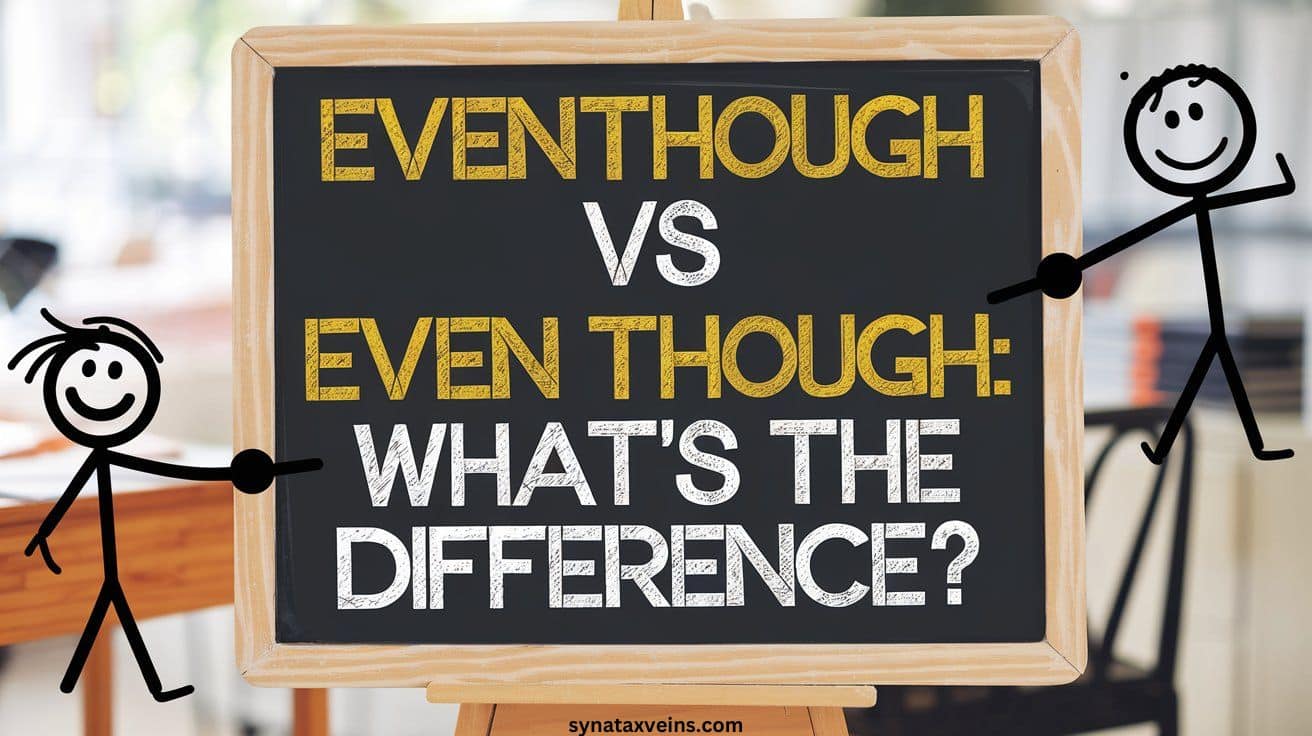English learners and even native speakers often confuse “eventhough” vs “even though” when writing. Many believe both are correct, but that’s not true. “Eventhough” is not a real word, while “even though” is a proper English phrase.
Understanding the difference between correct spelling, grammar rules, and proper sentence structure is essential for formal correctness in writing. In this guide, we’ll break it all down in simple English with examples, tables, and writing tips to improve your English writing skills.
Quick Summary
- “Even though” is correct and widely used in formal writing, academic writing, and professional writing.
- “Eventhough” is a spelling mistake and does not exist in standard dictionaries.
- “Even though” is a subordinating conjunction used to show contrast in a complex sentence.
- Many English learners and ESL students confuse these terms due to spelling errors and word mix-ups.
✅ Correct: Even though it was raining, they played outside.
❌ Incorrect: Eventhough it was raining, they played outside.
Understanding Eventhough Vs Even Though
Many people get confused between “eventhough” vs “even though”, often assuming they mean the same thing. However, the truth is simple: “even though” is the correct phrase, while “eventhough” is a common spelling mistake. Understanding the difference is crucial for proper spelling, sentence structure, and formal correctness in writing.
Whether you’re learning English, improving your grammar accuracy, or refining your writing skills, knowing when to use “even though” correctly will help you communicate clearly and effectively.
Why do people confuse them?
The confusion between “eventhough” or “even though” happens because of similar sounding words and incorrect usage. Many assume “even though” is a single word, leading to misspellings and grammar errors.
Common Writing Mistakes
Many learners mix up these words due to:
- Typos & Spelling Issues – People type too fast and miss spaces.
- Grammar Mistakes – Misunderstanding sentence formation and syntax rules.
- ESL Learners’ Confusion – Many second-language speakers struggle with word order.
Origins of Eventhough
The word “eventhough” does not exist in English rules. It emerged due to language mistakes and spelling issues in informal writing.
- Not recognized in Oxford Dictionary, Merriam-Webster, or Cambridge Dictionary.
- Grammar checkers and AI tools flag it as a spelling mistake.
- Incorrect spelling due to people thinking it works like “nevertheless” or “notwithstanding.”
Origins of Even Though
“Even though” has been in the English language for centuries. It is commonly used in academic writing, professional writing, and SEO content to ensure sentence clarity.
- Found in old literature and formal texts.
- Recognized by grammar tools as a correct phrase.
- Used in both spoken and written English.
READ MORE >>> The Great Apostrophe Debate: Student’s, Students vs Student’s
Eventhough: Definition and Usage
There is no definition for “eventhough” because it is a grammar error. If you use it in formal writing, your grammar checker will mark it as incorrect.
Eventhough Usage (Incorrect)
People mistakenly use “eventhough” in:
❌ Emails & Social Media: Eventhough I was late, I finished my work.
❌ Articles & Blogs: Eventhough the weather was bad, we traveled.
Synonyms of Eventhough
Since “eventhough” is incorrect, use these alternatives:
| Incorrect Word | Correct Alternatives |
|---|---|
| eventhough | even though, although |
| eventhough | despite, in spite of |
Even Though: Definition and Usage
“Even though” is a subordinating conjunction that introduces a contrast between two ideas in a complex sentence.
Even Though Usage (Correct)
Here’s how to use even though correctly:
✅ Formal Writing: Even though the project was delayed, it was successful.
✅ Everyday Speech: I went for a run, even though I was tired.
Even Though: Debunking Myths
Can even though be used in a complex sentence?
Yes! Even though introduces a dependent clause, making the sentence complex.
✅ Even though it was late, they continued studying.
What comes before even though?
A main idea or an unexpected situation.
✅ He smiled, even though he was nervous.
Is even though the same as despite?
No! They look similar but have different grammar rules:
| Phrase | Example |
|---|---|
| Even though | Even though it rained, we played. |
| Despite | Despite the rain, we played. |
How to Use “Even Though” Correctly
- Use it in contrast: Even though she studied, she failed the test.
- Don’t merge it: “Eventhough” is incorrect.
- Use it before a dependent clause: Even though it was late, she stayed awake.
Impact on Readability
Using “even though” correctly improves sentence clarity, grammar accuracy, and formal correctness.
- Search engines prefer grammatically correct content.
- Readers trust accurate writing over spelling mistakes.
How Dictionaries and Style Guides Determine Correct Spelling
Major Dictionaries’ Stance
| Dictionary | Correct Spelling |
|---|---|
| Merriam-Webster | Even though |
| Oxford English | Even though |
| Cambridge | Even though |
Everyday Usage Examples
- Formal Writing: Even though he disagreed, he remained respectful.
- Casual Writing: I’ll go, even though I don’t want to.
- SEO & Blogging: Even though SEO is complex, it helps rankings.
Even Though in Different Contexts
- Academic Writing: Used for essays and research.
- Business Writing: Often used in reports and proposals.
- Everyday Speech: Used in daily conversations.
When Should You Use “Even Though” in Writing?
Use “even though” when:
✔ You need to show contrast.
✔ You are writing correct spelling for professional writing.
✔ You are writing formal English or academic essays.
Eventhough Example (Incorrect)
❌ Eventhough she was tired, she kept working.
✅ Correction: Even though she was tired, she kept working.
Even Though 10 Example
- Even though I was late, I caught the train.
- She left, even though it was raining.
- Even though he tried, he failed.
- I bought it, even though I didn’t need it.
- Even though it was expensive, he bought it.
- She passed, even though she didn’t study.
- Even though it was cold, they went swimming.
- He smiled, even though he was sad.
- Even though the team lost, they played well.
- She accepted, even though she was nervous.
Frequently Asked Questions
What is the difference between even and even though?
“Even” is an adverb that can show emphasis or indicate something surprising, equal, or flat. It can be used in phrases like “even now,” “even better,” or “even if.”
“Even though” is a subordinating conjunction used to show contrast or contradiction between two ideas. It introduces a dependent clause that provides information despite the main idea.
For example:
- Even he was tired, he finished his work. (Here, “even” emphasizes the unexpectedness of the action.)
- Even though he was tired, he finished his work. (Here, “even though” introduces a contrast between being tired and finishing the work.)
What is the difference between even though and although?
“Even though” and “although” both introduce a contrast between two ideas, but “even though” is typically used to emphasize a stronger contrast or surprise. It tends to add more weight to the clause.
For example:
- Even though she studied hard, she failed the test. (More emphasis on the contrast.)
- Although she studied hard, she failed the test. (Still a contrast, but less emphatic.)
Both are grammatically correct, but “even though” is often used when the contrast is stronger or more unexpected.
How do you use even though correctly?
Use “even though” to introduce a dependent clause that shows a contrast or contradiction. It is typically followed by a subject and verb.
For example:
- Even though it was raining, they went for a walk.
- She kept working, even though she was exhausted.
Remember, “even though” should always be used to highlight an unexpected or surprising contrast between two ideas.
What is the difference between even though and however?
“Even though” shows a contrast and is used to connect ideas that go against each other, while “however” is a conjunctive adverb used to show a contrast or turn in thought, often at the beginning of a sentence.
For example:
- Even though the team played hard, they lost the game. (Contrast between playing hard and losing.)
- The team played hard. However, they lost the game. (Contrast between the two separate sentences.)
“However” is more formal and can be used to start a new sentence or in the middle, often with commas.
Conclusion
Understanding the difference between “eventhough” vs “even though” is important for formal writing and correct English usage. Remember:
- “Even though” is always correct and improves sentence clarity.
- “Eventhough” is a spelling mistake and should be avoided.
- Use “even though” to show contrast and write proper English.
By following these writing tips, you’ll improve your grammar accuracy, SEO optimization, and English writing skills. ✅

